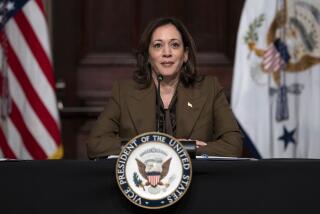U.S. Dampens Talk of Summit : But Reagan Sees New Hope for Arms Pact
- Share via
WASHINGTON — President Reagan said Thursday he believes that the Kremlin now is “in a different frame of mind” that strengthens the prospects for an arms reductions treaty, but the White House at the same time tried to tone down speculation about a U.S.-Soviet summit.
The lowering of summit fever, heightened earlier in the week by some anonymous White House aides, seemed to more closely reflect the actual attitude of the President and two key advisers, longtime confidant Michael K. Deaver and Donald T. Regan, the new White House chief of staff.
The posture of patience appeared to contrast with the more activist sentiments of national security adviser Robert C. McFarlane, who had been pushing for an early meeting between Reagan and new Soviet leader Mikhail S. Gorbachev.
White House spokesman Larry Speakes told reporters that it will be some time before Gorbachev even is “prepared to entertain the idea of” a summit. And a deputy spokesman, Marlin Fitzwater, referring to the day after Reagan’s first inauguration, asked rhetorically: “Would Ronald Reagan have been ready to meet with (Soviet leader Leonid I.) Brezhnev on Jan. 21, 1981?”
Gorbachev ‘Interested’
One Administration official, who declined to be identified, reported late Thursday that Gorbachev had told Vice President George Bush in Moscow on Wednesday that he was “interested” in a summit conference and, in effect, “We’ll get back to you.” But the official added that Gorbachev gave “no hint one way or other” whether or when he wanted to meet with Reagan.
Reagan, in his first non-prepared, extemporaneous comments on Gorbachev’s accession, Thursday expressed an upbeat view of future U.S.-Soviet relations during remarks at the White House to the Magazine Publishers Assn. But he made clear his optimism stemmed much more from the U.S. defense buildup than the Kremlin leadership change.
Asked during a question-and-answer session whether he believes that Gorbachev would be “fundamentally different” from his predecessors, Reagan replied: “I don’t think there’s any evidence that he is less dominated by their (Soviet) system, their philosophy, than any of the others.” After a slight pause, he added, “But it isn’t true that I don’t trust anyone under 70.”
When the laughter subsided, the 74-year-old President said of the Kremlin’s new 54-year-old leader: “I look forward to dealing with him. I think what is most evident . . . is that the Soviet Union is in a different frame of mind than they’ve been in the past. They are back at the negotiating table on arms reduction because they recognize a hard, cold fact, and that is that the United States isn’t going to unilaterally disarm in the face of their buildup.
‘A Healthy Respect’
“And now that they know they have to compete with us with regard to security needs, I think they’ve got a healthy respect for our technology and our industrial capacity and, I believe, they are going to really try with us to negotiate a reduction in armaments.”
Reagan continued: “That has never been done before. There have been agreements, like the SALT agreements, that only limited how fast you could increase (arms).”
The President’s cautious wait-and-see attitude regarding Gorbachev was echoed by Defense Secretary Caspar W. Weinberger during a breakfast meeting with reporters and editors of The Times’ Washington Bureau.
“I think he (Gorbachev) certainly is going to have better manners (than his predecessors),” Weinberger said. “(But) I would think because he is young and vigorous and will be there for quite some time . . . he would be a more difficult person to have across the table in negotiations. . . . I wouldn’t anticipate any change in policy, any softening to the West--quite the contrary: I would think it would be the opposite.”
A different slant on the situation had been presented to Reagan last Monday by McFarlane and Secretary of State George P. Shultz. They argued that the situation was now different than when the President turned down opportunities to attend the funerals of two previous Soviet leaders, and, as a dramatic symbolic gesture, he should join other heads of state in Moscow for the interment of President Konstantin U. Chernenko.
Timing Not Right
Reagan, however, agreed immediately with Deaver that it would appear phony for him to attend the funeral. Neither Deaver nor Regan felt the time or the setting were right for Reagan’s first meeting with Gorbachev, according to knowledgeable officials who asked not to be identified.
The President and all of his senior advisers, however, agreed that he should convey to Gorbachev--in a personal letter delivered by Bush--a willingness to meet substantively with the new Soviet leader when Gorbachev is ready, perhaps in the United States. This attitude had also been expressed by Reagan to Chernenko after his assumption of power.
“He’s certainly willing to meet with him and would hope to be able to do so at some future date,” Speakes said Thursday. “(But) the President has always had, in his own mind, a desire not to get into a summit that would raise expectations and then dash expectations in a matter of days”
Speakes added, “I think the President would like to have some agreed-upon topics to talk about. But at the same time, he would not insist, probably, on an agenda that was in as much detail as we had previously talked about . . . (although) I think he would like to have some serious discussions with the Soviet leader.”
As for the timing, the spokesman said of Gorbachev: “He has a number of things on his platter there. He may focus on those before he focuses on foreign travel. . . . “
More to Read
Sign up for Essential California
The most important California stories and recommendations in your inbox every morning.
You may occasionally receive promotional content from the Los Angeles Times.














